Introducing The Hockey Writers’ Countdown to Puck Drop series. From now until the puck drops on the 2019-20 NHL’s regular season on Oct. 2 when the Toronto Maple Leafs host the Ottawa Senators, we’ll be producing content that’s connected to the number of days remaining on that particular day. Some posts may be associated with a player’s number, while others will be connected to a year or length of time. We’re really excited about this series as we take you through the remainder of summer in anticipation of the return of NHL hockey.
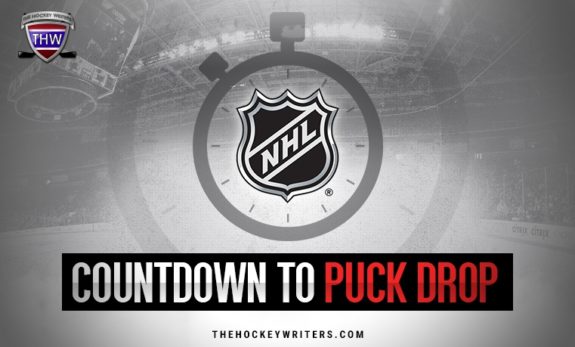
On day 52, it’s the perfect time to look back on the St. Louis’ Blues 52-year wait to capture the franchise’s first Stanley Cup. Part of the NHL’s original expansion in 1967, the team had a number of close calls, but it took the unlikeliest of comebacks in the 2018-19 season to finally realize the dreams of an entire city.
The Blues’ Auspicious Start
Along with the California Seals, the Los Angeles Kings, the Minnesota North Stars, the Philadelphia Flyers, and the Pittsburgh Penguins, the Blues joined the NHL during the League’s first expansion in 1967. In an effort to give the new teams something to play for, all six of the expansion franchises were put in one conference, so that one was guaranteed a trip to the Stanley Cup Finals.
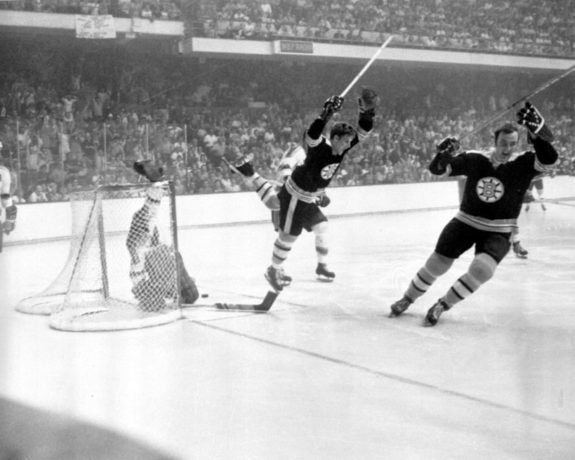
Backed by Mr. Goalie Glenn Hall, captained by one future Hockey Hall of Fame coach in Al Arbour, and coached by another in Scotty Bowman, the Blues were a force to be reckoned with. They were the class of the League’s six new teams, and they made it to the Stanley Cup Finals in each of their first three seasons.
But for three seasons in a row, that’s where the team’s luck would run out. They ran up against the mighty Montreal Canadiens in 1968 and 1969, and met Bobby Orr’s Boston Bruins in 1970. Unable to match the skill and star power of such established franchises, the Blues lost all twelve games they played in those series. But it seemed like the fledgling franchise was set up for future glory. Little did anyone know that the team wouldn’t return to the game’s greatest stage for 49 more years.
Numerous Close Calls
Though they wouldn’t reach the Stanley Cup Final again for almost half a century, that doesn’t mean the Blues didn’t see plenty of success. In their 52-year history, the team has only failed to qualify for the postseason nine times. More impressively, the Blues qualified for an astounding 25 consecutive playoff berths from the 1979-80 season until the 2003-04 season prior to the lockout-cancelled 2004-05 season.
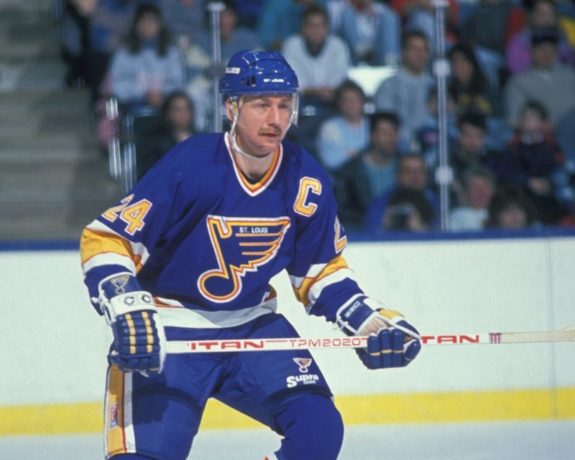
Many Hall of Famers and other greats wore the Blue Note or coached the team in their career, including Hall, Arbour, and Bowman, as well as Bernie Federko, Doug Gilmour, Paul Kariya, Brendan Shanahan, Grant Fuhr, Al MacInnis, Chris Pronger, Brett Hull, and, for a fleeting half-season, “the Great One” Wayne Gretzky. But the Blues could never catch lightning in a bottle and lift Lord Stanley’s Cup.
There were many “what-ifs,” though. In 1986, they lost in Game 7 of the Conference Finals to the Calgary Flames, despite matching 21-point playoff performances by Federko and Gilmour. In 1990-91, powered by one of the greatest tandems in league history, Hull and Adam Oates, who combined for 246 points in the regular season, they missed the President’s Trophy by one point and lost to the North Stars in the second round.
Then there was the 1995-96 season. Fuhr arrived in St. Louis overweight, but would go on to start a record 79 games. The Blues added Gretzky at the deadline, but Nick Kypreos collided with Fuhr in the second game of the playoffs, ending his season prematurely. Steve Yzerman would crush fans’ dreams by scoring his famed double-OT winner in Game 7 of the following round.
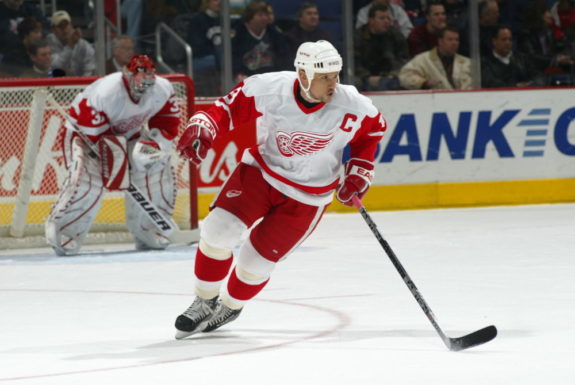
Just a few years later, the Blues won the franchise’s lone President’s Trophy, powered by Pronger’s Hart and Norris Trophy winning campaign. But goaltender Roman Turek fell apart in the playoffs, leading to perhaps the most agonizing exit ever for the Blues, a seven game loss in the first round to the San Jose Sharks. That team would beat them again in the Blues’ most recent deep playoff run, their Conference Final appearance in 2016.
Glory and “Gloria” in 2019
Entering the 2018-19 season, there was plenty of reason for excitement for Blues fans, given the team’s many new additions. But decades of reinforcement taught supporters never to become too comfortable, and sure enough, the beginning of the season felt more like a nightmare than a daydream.
As the New Year broke, the Blues were in shambles. Entering the morning of Jan. 3, 2019, they were in last place in the entire league, sitting 15-18-4 with just 34 points. But it was just a few days later that the team would find the two factors most responsible for transforming their season, both from the unlikeliest of sources.
The first was “Gloria,” a 1982 hit single from Laura Branigan. Originally translated from Italian, the song’s lyrics, about a down-on-her-luck woman who didn’t know her own worth, were a perfect encapsulation of the team at the time. On Jan. 6, a group of Blues players watched the Philadelphia Eagles playoff game at a bar before playing the Flyers the next night. An exuberant fan insisted the DJ keep playing Branigan’s “Gloria,” and the Blues fell in love with song, baptizing it as their new team victory march.
The second transformative factor arrived the next evening, when unheralded AHL goaltender Jordan Binnington debuted on the road with a shutout against the Flyers. Armed with a new anthem and a brand new goaltender, the team began to build momentum, and from Jan. 23 to Feb.19, they won a franchise-record 11 consecutive games. Back in the playoff picture, they continued to win, improving so much that they were in the running for first place in the Central Division on the last day of the season.
From Winnipeg to Boston
Armed with confidence, the Blues survived a tough first round matchup with the Winnipeg Jets, before the Dallas Stars took them to the limit in the second round. It was hometown hero Patrick Maroon who would score in double-OT, righting the 23-year-old wrong of Yzerman’s heart-crusher, to send the Blues to their second Western Conference Final in four seasons.
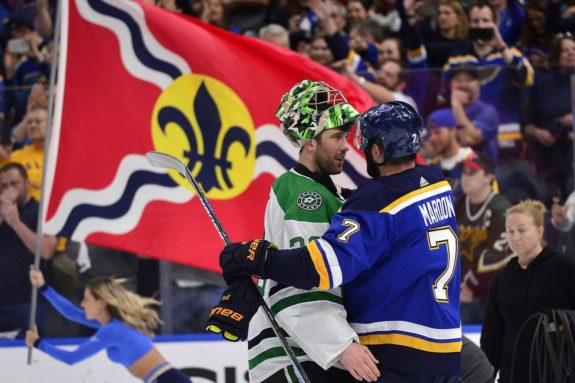
The Blues would continue to slay past demons in the next round, meeting the same Sharks that had barred their progress at that stage three years before. It was a challenging series, with one of the most controversial calls in the history of the NHL, but in the end, St. Louis won it convincingly in six games.
History had one more prank to play on the Blues, however, as it would be the Bruins, the team that had swept them in their last Stanley Cup Final appearance 49 years before, who awaited them in the final round. The series was everything anyone could hope for, except of course fretful fans of either team. The Blues battled back, won a game in overtime thanks to unlikely hero Carl Gunnarsson, and won critical games in one of the most difficult venues in the league. But the Bruins would force a Game 7 with a blowout victory in St. Louis in Game 6.
With everything on the line, the Blues finally came through where five decades of teams had failed. They won Game 7 4-1, with goals from Ryan O’Reilly, Alex Pietrangelo, Brayden Schenn, and hometown Bostonian Zach Sanford. Finally, the dreams of a city were realized. Finally, the Blues had captured a Stanley Cup.
A 52 Year Celebration
Known as a baseball city, St. Louis went ballistic for its first hockey championship. Estimates suggests that nearly 400,000 fans crowded the streets of downtown St. Louis for the victory parade, a number surpassing the population of the city itself. And the players and alumni were just as excited as the fans.
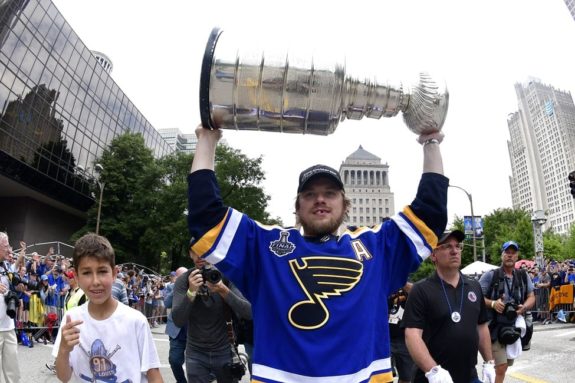
The massive crowds, the exuberant players, and the elated alumni were all fitting of a parade 52 years in the making. Fans were even treated to a special rendition of the team’s anthem, “Gloria,” by a particularly excited Hull. It was the perfect celebration of the team’s incredible accomplishment, a Stanley Cup Championship for which the city waited for more than half a century.